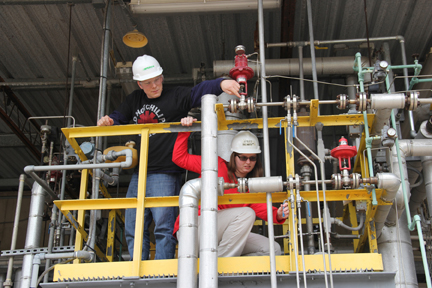Washington process technology students gain hands-on experience at COM lab

For a student, nothing tops firsthand experience. Recently students from Bellingham Technical College, in Bellingham, Wa., traveled 2,500 miles to gain hands-on practice in College of the Mainland’s process technology lab.
“This experience you can’t get anywhere else,” said Brett Barclay, 24. “It’s taking everything we’ve learned in the last two years and applying it.”
During a two-day crash course, students explored how the lab’s glycol separation unit
and observed how minor adjustments affected the flow, temperature and pressure of
the liquid coursing through it.
“I’ve never seen any of these controls before,” said student Eli Whitman, 21, a first-year
student, gesturing to the unit’s valves and gauges. “I’ve learned a ton so far.”
Everyone benefits from a mentor, even a college. When educators at Bellingham Technical
College sought to create a process technology program, they searched for the best
resources. COM supplied course syllabi, curriculum and notes on how to create a successful
program.
Now more than 90 students study in Bellingham Technical College’s process technology
program.
Later, Bellingham Technical College asked COM if their top students could visit for
hands-on training. COM agreed and the 10 visiting students were selected after a competitive
application process at their school.
“We don’t charge for this,” said Bill Raley, COM dean of industrial education. “This
is an opportunity to see process technology in action.”
In addition to providing valuable classroom and lab time, COM arranged a backstage
tour of Moody Gardens’ water operations and the Ocean Star Museum for the students
to view large-scale applications of their degree.
Bellingham Technical College is not the first to look to COM’s process technology
program as a model for excellence. The program boasts one of the highest job placement
rates in the state - nearly 89 percent in 2011-12 - and is fourth in the nation in
the number of degrees awarded science technology/technicians, according to Community
College Week.
Many schools from Palo Alto College in San Antonio to Alaska Technical Center in have
traveled to see the program’s success and view the glycol separation unit, a piece
of industry equipment that few colleges possess.
As the process technology field grows nationwide, graduates face open doors in industries
from energy to food processing.
The COM process technology program’s introduction class has no prerequisites. While
including rigorous courses in chemistry, physics and math, the program incorporates
hands-on learning as students learn through skits, sketching and labs.
“Students who are really successful in the program are kinetic learners, who learn
by doing,” said Raley. “It is not about rote memory, it is about applying knowledge.”
To learn more about the COM process technology program’s day and night classes offered
at a nearly a third of the cost of private institutions, visit www.com.edu/ptec.
